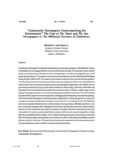Please use this identifier to cite or link to this item:
https://cris.library.msu.ac.zw//handle/11408/659Full metadata record
| DC Field | Value | Language |
|---|---|---|
| dc.contributor.author | Mushuku, P. | - |
| dc.contributor.author | Taruva, L. | - |
| dc.date.accessioned | 2015-09-14T10:02:57Z | - |
| dc.date.available | 2015-09-14T10:02:57Z | - |
| dc.date.issued | 2013 | - |
| dc.identifier.issn | 1815-9036 | - |
| dc.identifier.uri | http://hdl.handle.net/11408/659 | - |
| dc.description.abstract | Community media ought to be vehicles for development yet community newspapers in the Midlands Province of Zimbabwe seem to be lagging behind in terms of environmental reportage. The researchers contend that the media are underreporting environmental issues thereby failing to contribute meaningfully to the overall climate change discourse. The research concentrated on stories that were carried in The Sun and The Times during the years 2008 to 2010. The research was carried out using interviews and documentary evidence. From the actual stories, the researchers found that community newspapers tend to cover natural disasters mostly. Man-made environmental problems such as land degradation, deforestation and veld fires are not given much prominence yet they are factors that contribute to climate change. Interviews with editors and journalists from the two media houses yielded lack of resources such as transport, staff shortages, lack of adequate training for journalists in environmental reporting, fear of political reprisals as well as the relatively low salience that is placed on environmental stories as the biggest factors hampering environmental reporting. The Environmental Management Authority was also castigated for not doing enough by not carrying out campaigns to educate the public about caring for the environment. On a comparative scale, The Times had more environmentally related stories but in terms of depth of coverage of issues, The Sun scored better. In as far as community newspapers fail to highlight pertinent issues regarding the environment, they are doing a disservice to the communities they report to by failing to provide information that empowers the same communities. For instance, newly resettled farmers continue to fell trees and cause land degradation, thereby affecting sustainability of their activities. From a political economy perspective, the researchers recommend that community newspapers diversify their sources of income in order to reduce their susceptibility to external influence, political or otherwise. The researchers also recommend components of environmental reporting in training institutions as well as refresher courses for practicing journalists. | en_US |
| dc.language.iso | en | en_US |
| dc.publisher | Midlands State University | en_US |
| dc.relation.ispartofseries | The Dyke;Vol.8, No.1, p. 184-200 | - |
| dc.subject | Environmental reporting, community newspapers, climate change, sustainable development | en_US |
| dc.title | "Community newspapers underreporting the environment.”: the case of the Times and the Sun newspapers in the Midlands province of Zimbabwe. | en_US |
| dc.type | Article | en_US |
| item.grantfulltext | open | - |
| item.openairecristype | http://purl.org/coar/resource_type/c_18cf | - |
| item.fulltext | With Fulltext | - |
| item.languageiso639-1 | en | - |
| item.openairetype | Article | - |
| item.cerifentitytype | Publications | - |
| Appears in Collections: | Research Papers | |
Files in This Item:
| File | Description | Size | Format | |
|---|---|---|---|---|
| mushuku.pdf | 11.89 MB | Adobe PDF |  View/Open |
Page view(s)
262
checked on Feb 28, 2026
Download(s)
118
checked on Feb 28, 2026
Google ScholarTM
Check
Items in MSUIR are protected by copyright, with all rights reserved, unless otherwise indicated.



